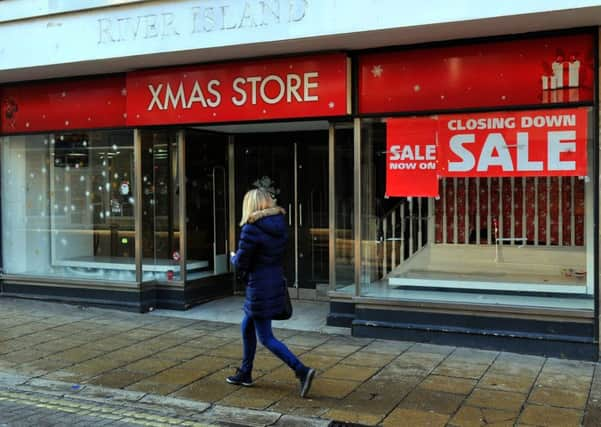Catherine Shuttleworth: Let’s work together to save our high streets


Since then we’ve seen a Christmas sales period that clearly demonstrates that retail is still going strong – with £1 in every £5 now spent online and online only retailers producing some stellar results – boohoo saw sales increases of a third, Ao.com with like for like sales of 8.2 per cent and smaller more agile retailers and independents outperforming the traditional high street giants.
It is the high street that is struggling, not the retail sector as a whole, and this is due to a fundamental shift in the way we live our lives and the big casualties are high streets in towns across the region and the UK.
Advertisement
Hide AdAdvertisement
Hide AdThe reality is that supply of retail space in the UK now outstrips demand. The collapse of HMV into administration in late December lays bare the challenge. The business had 125 stores across the UK, operating in categories that are now online or dying.
In 2018 DVD sales declined by 30 per cent year on year – even with the best customer service in the world retailers can’t sell us stuff we no longer want to buy. HMV still has a place as a retail brand but it was unable to survive with a property tax bill of £15m on sales of £277m – it’s not a viable business with that many shops and decreasing customer footfall. Increasingly I read negative comments suggesting that the decisions retail businesses make are all financial, but if you are a shareholder this should be reassuring news!
It’s important to realise that every retail business in the UK is just that, a business, and the management of these organisations need to consider how to manage their businesses successfully in a new era of shopping where physical stores will play a different role, with many becoming showrooms or providing a community benefit.
The big names in UK retail will not close stores easily. The financials will play a part, but so will their social responsibility. Marks & Spencer in particular know that any proposed store closure will create impact locally, however even they must make decisions that protect their business in the longer term – none of us want to see M&S leave the high street so we have to be hopeful that the business transformation plan in progress will protect it in the longer term – but we don’t shop M&S like we used to so we have to let the business evolve to match our needs.
Advertisement
Hide AdAdvertisement
Hide AdUltimately, it is really up to all of us to work together to find a new way forwards for our high streets that shouldn’t be reliant on a small handful of big businesses but a blend of retail, housing, entertainment, recreation and education.
Local communities can choose to decide their own fate through working together to deliver a town centre that suits local needs. The combined brains and talents of local councils, BID groups and trade federations, supported by entrepreneurs on the ground who often have an intrinsic knowledge of the local market, can mean that great things happen.
I’m a huge fan of the Barnsley Market project which is redefining the town centre by creating new opportunities for local traders, a new central point for the town and a working partnership between existing retailers and new start-ups. The Barnsley solution isn’t right for every high street but its principle is one that can be shared.
And more importantly it’s this simple communication to the people of Barnsley found on bill boards in the town which makes a massive difference – if every resident spent just £5 in the town centre once a week that would create £60m a year back into the local economy and that’s good for everyone.
Advertisement
Hide AdAdvertisement
Hide AdWe know it’s tough, with job losses in the sector set to rocket this year, economic uncertainty impacting consumer confidence and a completely inequitable method of taxation between on and off line retailers, the odds seem stacked against the high street.
We need the government to step up and look at the big issues facing the sector and give this more focus. We need a minister for the high street and retail who can completely focus on this instead of squeezing it into a portfolio of tasks and splitting the role between two different ministers.
And where are the banks ? In October I commented on the speed at which the banks are abandoning the high streets in their hour of need. Last week Santander announced another 140 branch closures of which 10 are in Yorkshire high streets.
The banks are encouraging us all to bank online and via telephone banking but many local business owners and others in the community still need to access banking facilities.
Advertisement
Hide AdAdvertisement
Hide AdI believe that the banking sector could play an impactful role in the high street working with local communities to create a community support fund and encourage entrepreneurs to start high street businesses and support them.
And what about us?
Everybody is a shopper and we need to review the choices we make. How can we expect high streets to thrive if we don’t use them and we need to ask ourselves can we find ways in communities to connect better with local retailers.